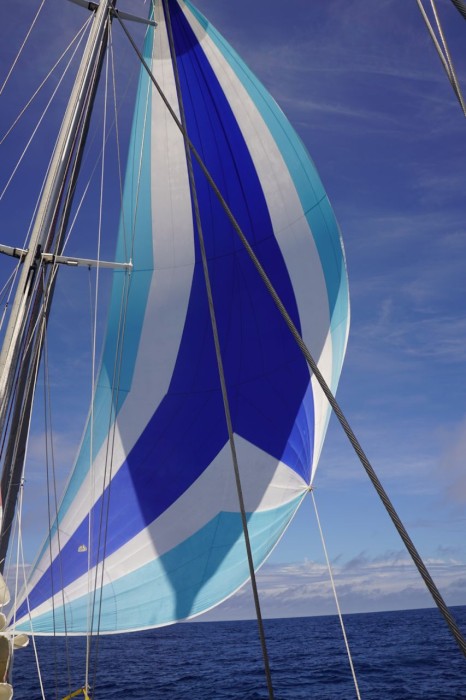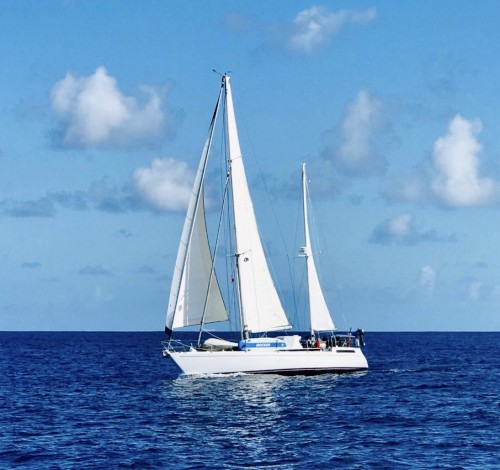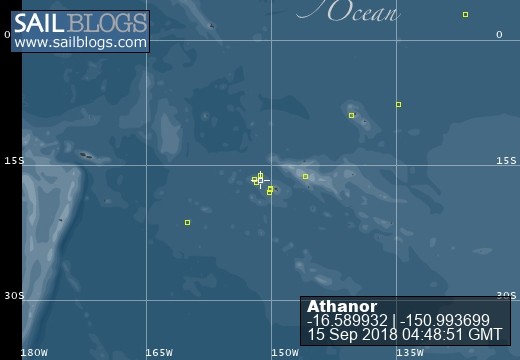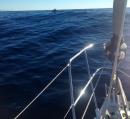Week III and the Home Stretch

It's 12:30a.m. I'm on night watch. I'll do my best to bring you along with me - tonight is not like every night on the passage (as you will read later in this post). It's 73 degrees; water temperature is 85 degrees; winds are from the east at 12-15 knots; Athanor is cruising along at 5-6 knots with a double-reefed main and a reefed headsail. Chet, our rock-star autopilot, is at the helm. It is a beautiful balmy night. The sky is lit up with stars beyond where the eye can see with just a sliver of moon as she builds her way back. As I look out over the beam of the boat, our wake lights up the sea - phosphorescence. If I shine a flashlight in the water, just below the surface I see tiny fish glowing fluorescent yellow.
I feel compelled to describe with a bit more detail exactly what night watch means - and doesn't mean. When sailing down the coast and especially in Mexico, a large part of watch meant looking for other boats. That indeed is still a responsibility during this passage; however, we have not seen another vessel since just outside Manzanillo, Mexico. During this passage, the nights have ranged from calm (a few) to very active (most). It can include, and has been to a large degree on this passage, monitoring and managing squall activity - looking at the sky and radar for specific types of clouds. Monitoring the size and direction (is this thing coming right at us?) of the squall. When in fact it does "come right at us", it means getting wet and changing clothes a couple of times. Night watch can include managing the ever-shifting wind - one minute it's blowing 15 knots out of the east, and then we're down to 3 knots out of the south, stuck in the swells, sails banging away, unhappy. Meanwhile, the spouse is down below (when we're underway, the dining table is lowered and turns into a bed), so you really need to be on deck so as not to wake this person during their precious 2-3 hours of sleep. Bottom line, it is anything but "quiet time."
We emerge from the night with our daily morning rituals. Whilst making coffee, we download weather data and email via our sat phone or SSB connection, and try to check in and participate in a daily radio net at 1400 UTC (7am or so "local" time in the middle of the eastern Pacific). At first, that occurred during daylight, but as we've progressed west, it's been progressively darker at that time. Taking stock of the weather at daybreak, we make any needed sail adjustments / changes, position our sun awnings, set out our two additional flexible solar panels, and figure out what to make for breakfast. Following breakfast, we settle into our daylight passage making routines.
Daylight passage making is, seemingly, largely about recovering from and getting ready for nighttime passage making. The winds are generally are more stable and consistent, and so we only make minor sail adjustments during the day. Time is spent with relatively mundane activities as preparing, eating, and cleaning up from meals; adjusting the angle of the solar panels; making water; checking all the rigging and boat systems for potential issues; repairing anything that needs attention; finding lost items from the night before; and NAPPING. But it is especially hard to nap below during the heat of the day at the equator. Even with fans going full out, it is stiflingly hot and muggy. We try and get dinner prepared on the early side and the boat ready for the night watch (see above) before dark, but we haven't always been successful in that due to the heat. And when that's the case, we've often found ourselves reefing sails and clearing the decks in the dark just as the winds are starting to shift and /or the weather is changing. Just to add a little more stress...
When Rob and I were new in our relationship, we went on what has been affectionately referred to as "the shakedown cruise." We were 6-months in; we lived 700 miles away from each other; and I had never been sailing. As I look back, it indeed was a turning point for us. The adventure brought us closer. Now six 6-months into our marriage, I am struck by the parallel of this passage. Rob and I have a pretty easy go of things as relationships go, and this passage has provided us with copious opportunities to work through relationship challenges that surface in different ways when on land and in our day-to-day life. We have emerged a stronger, more trusting, and more respectful couple. The stakes are high - we are depending on each other in a way we've not been called to do before. We have seen our mate kick ass in very taxing situations and brought to tears when he/she is wiped out.
What did week 3 bring us? We thought week two was the hardest -we were wrong - our 3rd week has now taken the title. By week three, we know we're on the other side, yet there are few energy reserves in the tank. It's like being riding a train with the engine running for days on end - then it stops, and it's quiet. We realize we've been "on" - on edge - really, everyday.
Squalls, swells, wind, and more squalls. In addition to forever (as in 24/7) adjusting our sails to align with current winds and seas, our days/nights are spent tracking oncoming squalls, either trying to maneuver around them, or riding them out (and taking advantage of the wind they create). For example, we were running with a squall, which lasted 2-1/2 hours. Then, as it finally past, the winds kicked up to 30 knots, with torrential rain, and we quickly needed to get on deck to furl in the headsail. We were reminded once again exactly who's in charge out here. That, plus sustained winds and seas into the night, makes for little sleep.
Snack rich, produce poor. We'd read that week three is typically the week fresh fruit/veggies run out or spoil. I didn't want to believe it, but it's true. Save for 1 small watermelon and 2 heads of cabbage, these two spoiled Seattleites will have to wait for landfall for these delicacies. Same for eggs - I'm saving one so I can make a cake for Rob's birthday on the 13th. And, oh yes, we underestimated our daily energy consumption (hey, wait a minute, isn't the captain of this vessel in the energy field?) and our solar panels haven't been able to keep us, so we can't run our freezer as much cook it now or lose it. Guess who's having Mac 'n Cheese for dinner?
We're in the home stretch now. As I write, we have approximately 300 miles (2-1/2+ days) to reach Hiva Oa. The last two days have been great sailing - and squall free. Fingers crossed we stay this course for the duration. Will write when we've made landfall- after a very cold beverage and some much needed sleep.
Cheers,
Susan and Rob
I feel compelled to describe with a bit more detail exactly what night watch means - and doesn't mean. When sailing down the coast and especially in Mexico, a large part of watch meant looking for other boats. That indeed is still a responsibility during this passage; however, we have not seen another vessel since just outside Manzanillo, Mexico. During this passage, the nights have ranged from calm (a few) to very active (most). It can include, and has been to a large degree on this passage, monitoring and managing squall activity - looking at the sky and radar for specific types of clouds. Monitoring the size and direction (is this thing coming right at us?) of the squall. When in fact it does "come right at us", it means getting wet and changing clothes a couple of times. Night watch can include managing the ever-shifting wind - one minute it's blowing 15 knots out of the east, and then we're down to 3 knots out of the south, stuck in the swells, sails banging away, unhappy. Meanwhile, the spouse is down below (when we're underway, the dining table is lowered and turns into a bed), so you really need to be on deck so as not to wake this person during their precious 2-3 hours of sleep. Bottom line, it is anything but "quiet time."
We emerge from the night with our daily morning rituals. Whilst making coffee, we download weather data and email via our sat phone or SSB connection, and try to check in and participate in a daily radio net at 1400 UTC (7am or so "local" time in the middle of the eastern Pacific). At first, that occurred during daylight, but as we've progressed west, it's been progressively darker at that time. Taking stock of the weather at daybreak, we make any needed sail adjustments / changes, position our sun awnings, set out our two additional flexible solar panels, and figure out what to make for breakfast. Following breakfast, we settle into our daylight passage making routines.
Daylight passage making is, seemingly, largely about recovering from and getting ready for nighttime passage making. The winds are generally are more stable and consistent, and so we only make minor sail adjustments during the day. Time is spent with relatively mundane activities as preparing, eating, and cleaning up from meals; adjusting the angle of the solar panels; making water; checking all the rigging and boat systems for potential issues; repairing anything that needs attention; finding lost items from the night before; and NAPPING. But it is especially hard to nap below during the heat of the day at the equator. Even with fans going full out, it is stiflingly hot and muggy. We try and get dinner prepared on the early side and the boat ready for the night watch (see above) before dark, but we haven't always been successful in that due to the heat. And when that's the case, we've often found ourselves reefing sails and clearing the decks in the dark just as the winds are starting to shift and /or the weather is changing. Just to add a little more stress...
When Rob and I were new in our relationship, we went on what has been affectionately referred to as "the shakedown cruise." We were 6-months in; we lived 700 miles away from each other; and I had never been sailing. As I look back, it indeed was a turning point for us. The adventure brought us closer. Now six 6-months into our marriage, I am struck by the parallel of this passage. Rob and I have a pretty easy go of things as relationships go, and this passage has provided us with copious opportunities to work through relationship challenges that surface in different ways when on land and in our day-to-day life. We have emerged a stronger, more trusting, and more respectful couple. The stakes are high - we are depending on each other in a way we've not been called to do before. We have seen our mate kick ass in very taxing situations and brought to tears when he/she is wiped out.
What did week 3 bring us? We thought week two was the hardest -we were wrong - our 3rd week has now taken the title. By week three, we know we're on the other side, yet there are few energy reserves in the tank. It's like being riding a train with the engine running for days on end - then it stops, and it's quiet. We realize we've been "on" - on edge - really, everyday.
Squalls, swells, wind, and more squalls. In addition to forever (as in 24/7) adjusting our sails to align with current winds and seas, our days/nights are spent tracking oncoming squalls, either trying to maneuver around them, or riding them out (and taking advantage of the wind they create). For example, we were running with a squall, which lasted 2-1/2 hours. Then, as it finally past, the winds kicked up to 30 knots, with torrential rain, and we quickly needed to get on deck to furl in the headsail. We were reminded once again exactly who's in charge out here. That, plus sustained winds and seas into the night, makes for little sleep.
Snack rich, produce poor. We'd read that week three is typically the week fresh fruit/veggies run out or spoil. I didn't want to believe it, but it's true. Save for 1 small watermelon and 2 heads of cabbage, these two spoiled Seattleites will have to wait for landfall for these delicacies. Same for eggs - I'm saving one so I can make a cake for Rob's birthday on the 13th. And, oh yes, we underestimated our daily energy consumption (hey, wait a minute, isn't the captain of this vessel in the energy field?) and our solar panels haven't been able to keep us, so we can't run our freezer as much cook it now or lose it. Guess who's having Mac 'n Cheese for dinner?
We're in the home stretch now. As I write, we have approximately 300 miles (2-1/2+ days) to reach Hiva Oa. The last two days have been great sailing - and squall free. Fingers crossed we stay this course for the duration. Will write when we've made landfall- after a very cold beverage and some much needed sleep.
Cheers,
Susan and Rob









Comments